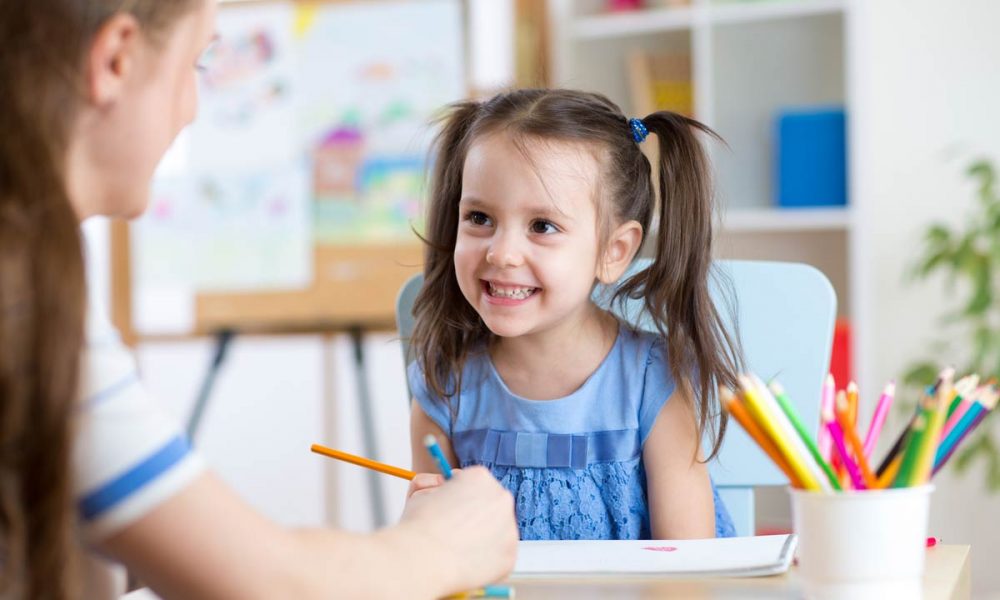ASHA Expert Explains Key Skills Needed for a Successful School Transition and How Parents Can Help Kids Build Them
Summer may have just begun, but parents who have children entering kindergarten this fall may already be thinking ahead to the first day of school. Although this is an exciting time, it can also be a stressful one as parents consider whether their child is fully prepared for this important milestone.
Deborah Dixon, MS, CCC-SLP, director of school services for the American Speech-Language-Hearing Association (ASHA), advises parents to relax—as most children will do just fine with this transition. However, she notes that a little dedicated preparation (in the form of real-life experiences as opposed to formal workbooks or apps) goes a long way.
Dixon details four key skills that children need for a successful school experience—as well as four ways to prepare your child this summer in simple, everyday ways. This is an important topic, with new research showing that kindergarten readiness is tied to long-term academic success, and some teachers expressing concerns that kids’ skills are lacking because of too much time on tech devices in their formative years.
Essential skills that are the foundation of school-readiness include:
- Communication skills—sharing one’s thoughts, wants, and needs as well as understanding the thoughts, wants, and needs of others.
- Social skills—successfully interacting and sharing experiences with peers as well as with adults. This involves turn taking, initiating and concluding conversations, and using appropriate gestures, facial expressions, and intonations, among other things.
- Independence and self-regulation—being able to complete age-appropriate tasks without assistance (e.g., washing hands and getting dressed) as well as being able to control one’s emotions and behaviors.
- Problem solving, collaboration, and following directions—knowing how to play with other children, work with other children and teachers, and solve the hundreds of small problems that may come up every day.
Providing your child with occasions to experience the world with you offers important opportunities to enhance many of these skills, Dixon says. Here are some day-to-day activities that can be turned into invaluable learning experiences:
- Household tasks—Engaging your child in sorting laundry by color, size, and type of clothing; counting silverware as it is unloaded from the dishwasher; following directions (e.g., “Can you find the colander and put it beside the pasta dish?”); and practicing decision making (e.g., “Would you like to wear the blue top or the green one?”) all work on essential skills. Help children to be independent when getting dressed and brushing their teeth. Assign them simple chores to complete.
- Neighborhood walks— Compare the shapes, colors, and objects that you see. Use basic concept words such as in front of, behind, beside, and above, and talk about things that are bigger, wider, softer, and so forth. Ask your child to name something that they saw at the beginning of the walk. Name the kinds of trees and plants that you passed. Make up stories as you walk along, and have your child contribute to the stories.
- Reading—An evening ritual signals the end of the day, provides quiet time for parents and children, and develops a love of reading. As you read to your child, stop and ask simple questions that requires them to remember what was read, or ask questions that probe their thoughts. Count how many pages are in the book, and talk about the cover and pictures (e.g., “What is between the dog and the cow?”; “Which one is smaller?”; “Which is the most colorful?”). Stop and ask how they think the story may end. Draw pictures about the book.
- “Field trips” to the zoo, parks, and museums—Trips to these places provide a great opportunity to build vocabulary, social skills, and overall language. Name objects and describe what they look like and how they are used. Ask those questions of your child. Talk about how the animals feel, sound, and move; talk about what they eat and where they live (e.g., oceans, mountains, beach, jungle). Run, skip, and hop around the park and talk about those movement words. In the museum, talk about things you don’t use or see in your world anymore and how they were used.
Dixon advises that if you have concerns about your child’s communication skills, contact your local school district to be put in touch with a certified speech-language pathologist, or search the ASHA website at www.asha.org/profind to find a professional. By practicing important skills, and identifying any potential communication problems early, you can set your child on a path to academic and social success.





No comments